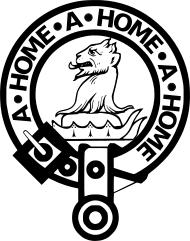Clan Home
| Clan Home | |||
|---|---|---|---|
 |
|||
| Motto | True to the End | ||
| Slogan | A Home, A Home, A Home | ||
| Profile | |||
| Region | Borders | ||
| District | Berwickshire | ||
| Plant badge | Broom | ||
| Chief | |||
 |
|||
| David Alexander Cospatrick Douglas-Home | |||
| Earl of Home | |||
| Seat | The Hirsel | ||
| Historic seat |
Hume Castle Fast Castle |
||
|
|||
|
|||
Clan Home (pronounced and sometimes spelt Hume) is a Scottish clan. They were a Border family of immense power.
The Homes trace their descent in the male-line from Cospatrick I (died after 1074), the Anglo-Danish Earl of Northumbria. His great-great-great-grandson William de Home, a younger son of Patrick, Earl of Dunbar, adopted the surname following his acquisition of the lands of Home and Greenlaw in Berwickshire in the early 13th century. William's arms featured the silver lion of Dunbar but with a green field instead of a red field, in reference to his lands of Greenlaw.
In the 14th century, William's descendant Sir Thomas Home married Nichola, heiress to the Pepdies of Dunglass. From this marriage the Homes acquired the lands of Dunglass (where they built the Collegiate Church of Dunglass, still extant today), and also began quartering their arms with those of Pepdie, being three green "papingoes" or parrots in a silver field. This is one of the earliest examples of quartering in Scottish heraldry.
Sir Thomas and Nicola had two sons. The first, Alexander, succeeded to the chieftaincy of the family, while the second, David, founded the family's principle cadet branch, the Homes of Wedderburn.
In 1402, Sir Alexander Home of that Ilk and of Dunglass was captured at the Battle of Homildon. Later he followed the Earl of Douglas to France but was killed in battle in 1424. Most of the principal cadet branches of the clan are descended from his three sons. In 1473 his great-grandson was made Great Chamberlain of Scotland and Warden of the Marches, and also created a Lord of Parliament under the title Lord Home. He joined Prince James' rebellion against his father King James III, and had a commanding role in the Battle of Sauchieburn which resulted in the death of the king.
...
Wikipedia
